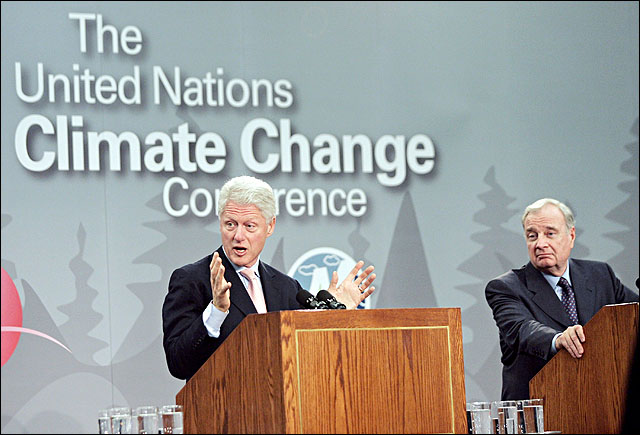Clinton: Bush ‘flat wrong’ on Kyoto’s economic effects
U.N. Climate conference
Montreal ? Former President Clinton told a global audience of diplomats, environmentalists and others Friday that the Bush administration is “flat wrong” in claiming that reducing greenhouse-gas emissions to fight global warming would damage the U.S. economy.
With a “serious disciplined effort” to develop energy-saving technology, he said, “we could meet and surpass the Kyoto targets in a way that would strengthen and not weaken our economies.”
Clinton, a champion of the Kyoto Protocol, the existing emissions-controls agreement opposed by the Bush administration, spoke in the final hours of a two-week U.N. climate conference at which Washington has come under criticism for its stand.
Most delegations appeared ready Friday to leave an unwilling United States behind and open a new round of negotiations on future cutbacks in the emissions.
“There’s no longer any serious doubt that climate change is real, accelerating and caused by human activities,” Clinton said. “We are uncertain about how deep and the time of arrival of the consequences, but we are quite clear they will not be good.”
Canadian officials said the U.S. delegation was displeased with the last-minute scheduling of the Clinton speech. But U.S. delegation chief Paula Dobriansky issued a statement saying events like Clinton’s appearance “are useful opportunities to hear a wide range of views on global climate change.”
The former president spoke between the official morning and afternoon plenary sessions of the conference, representing the William J. Clinton Foundation, which includes a climate-change program in its activities.

Former President Bill Clinton and Canadian Prime Minister Paul Martin, right, speak to reporters Friday at the U.N. climate conference in Montreal.
In the real work of the conference, delegates from more than 180 countries bargained behind closed doors until 6:30 a.m. Friday, making final adjustments to an agreement to negotiate additional reductions in carbon dioxide and other gases after 2012, when the Kyoto accord expires.
Efforts by host-country Canada and others to draw the United States into the process were failing. The Bush administration says it favors a voluntary approach, not global negotiations, to deal with climate issues.
“It’s such a pity the United States is still very much unwilling to join the international community, to have a multilateral effort to deal with climate change,” said Kenya’s Emily Ojoo Massawa, chair of the African group of nations at the two-week long conference.





